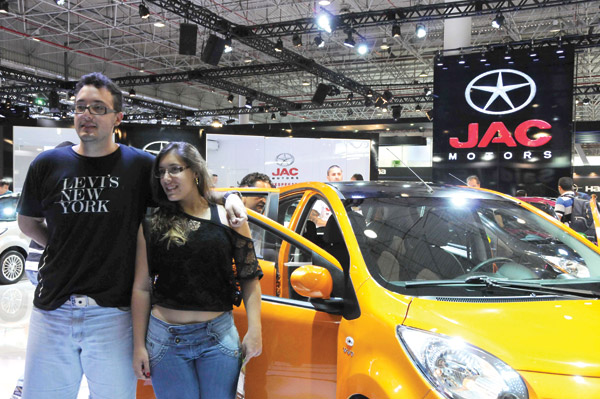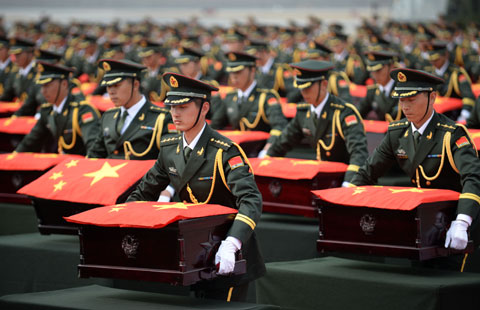Chinese carmakers getting a strong foothold in Brazil
Updated: 2014-03-31 05:52
By Zhang Fan in Beijing (China Daily Latin America)
|
||||||||
Leading Chinese automaker JAC Group recently announced that its factory in Brazil will commence operations in 2015, with an estimated output of 100,000 vehicles per year.
The factory will require a $600 million investment by JAC and is expected to produce vehicle models at a price under $27,000.
 |
|
Local people pose before Chinese automaker JAC Group's display booth at the 27th Sao Paulo International Automobile Trade show in this file photo. XINHUA |
"The Brazilian automotive market is dominated by brands from the United States and Europe, so it is a big challenge for Chinese automakers to enter this market with higher requirements of quality and service," said She Cairong, vice-general manager of JAC in charge of international business, in a recent interview.
The company, based in Anhui province, also announced it would produce two new models — the J3 S and J3 Turine — both equipped with 1.5-liter gasoline-ethanol dual-fuel engines, to meet Brazilian customers' preferences.
Local media praised the new models as not only for their improved engine performance but for their appearance.
She said JAC has paid special attention to localizing its products in Brazil.
"Before we put our products into the Brazilian market, we made more than 200 changes to the original models," he said.
JAC entered the Brazilian market in 2011.
According to Brazil's National Automobile Dealers Association, JAC's sold 748 vehicles in February in Brazil, ranking 12th among all the automotive brands in the market.
As the world's fourth-largest automotive market, Brazil has become a major target for Chinese automakers willing to go international.
Besides JAC, Chery Automobile, Geely Holding Group and Lifan Industry also entered this market to produce middle- and lower-class family cars and commercial vehicles.
Meanwhile, BYD Auto will provide electric buses to Brazil beginning in June for public transportation, and the company will invest $100 million to build a factory in Sao Paulo.
Industry statistics show that among the 51 automotive brands in Brazil, 12 are from China, making it the largest exporter aiming at the Brazilian auto market.
After the Brazilian government increased the tax rate on imported vehicles by 30 percent, foreign automakers including Chinese companies adjusted by building factories in Brazil.
Industry observers think the move will help to guarantee better after-sale service and win the trust of Brazilian customers.
However, the further development of Chinese auto manufacturing in Brazil still faces many challenges. Local media reported, for example, that Brazilian vehicle sales saw a 1 percent decrease in 2013, marking the first decrease in 10 years. The trend is expected to continue.
Observers think that with more foreign automotive companies establishing factories in Brazil, the country is likely to face an overcapacity problem by 2017, when production is expected to reach 6 million vehicles per year.
"Even so, we still have confidence in the Brazilian market because Chinese vehicle companies have advantages," said Wang Quan'an, president of the Institute of Portuguese Language Countries.
The key solution for Chinese automakers, Wang said, is to develop "core technology". New-energy vehicles and mass-transportation vehicles will play a very important role for Chinese companies in the local market, Wang said.
"We need to encourage our own brands to enter and pursue further development in foreign countries. There is still a long way to go," said Wang, a former commercial promotions officer at China's Department of Commerce.

 Xi watches China-Germany youth football match in Berlin
Xi watches China-Germany youth football match in Berlin
 Participants run for color
Participants run for color
 Indian air force cargo plane crashes, killing 5
Indian air force cargo plane crashes, killing 5
 Highlights of the Baselworld 2014
Highlights of the Baselworld 2014
 Obama tours the Colosseum
Obama tours the Colosseum
 Green Snake premieres in DC; an enchanting mystery
Green Snake premieres in DC; an enchanting mystery
 Trans-Pacific-City, State bonds celebrated
Trans-Pacific-City, State bonds celebrated
 Remains of Chinese soldiers in Korean War return
Remains of Chinese soldiers in Korean War return
Most Viewed
Editor's Picks

|

|

|

|

|

|
Today's Top News
Xi pledges to bolster ties with Belgium, EU
No substantive findings for MH370
Fujian relaxes one-child policy
Overseas returnees vie for jobs
Putin calls Obama to talk Ukraine
China, Germany to build yuan center
Turkey labels YouTube leak a 'plot'
DPRK lashes out at ROK 'gangsters'
US Weekly

|

|







